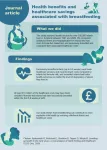(Press-News.org) MINNEAPOLIS – People who eat more ultra-processed foods like soft drinks, chips and cookies may have a higher risk of having memory and thinking problems and having a stroke than those who eat fewer processed foods, according to a new study published in the May 22, 2024, online issue of Neurology®, the medical journal of the American Academy of Neurology. The study does not prove that eating ultra-processed foods causes memory and thinking problems and stroke. It only shows an association.
Ultra-processed foods are high in added sugar, fat and salt, and low in protein and fiber. They include soft drinks, salty and sugary snacks, ice cream, hamburger, canned baked beans, ketchup, mayonnaise, packaged breads and flavored cereals. Unprocessed or minimally processed foods include meats such as simple cuts of beef, pork and chicken, and vegetables and fruits.
“While a healthy diet is important in maintaining brain health among older adults, the most important dietary choices for your brain remain unclear,” said study author W. Taylor Kimberly, MD, PhD, of Massachusetts General Hospital in Boston. “We found that increased consumption of ultra-processed foods was associated with a higher risk of both stroke and cognitive impairment, and the association between ultra-processed foods and stroke was greater among Black participants.”
For the study, researchers looked at 30,239 people age 45 or older who self-identified as Black or white. They were followed an average of eleven years.
Participants filled out questionnaires about what they ate and drank. Researchers determined how much ultra-processed food people ate by calculating the grams per day and comparing it to the grams per day of other foods to create a percentage of their daily diet. That percentage was calculated into four groups, ranging from the least processed foods to the most processed foods.
Of the total participants, researchers looked at 14,175 participants for cognitive decline and 20,243 participants for stroke. Both groups had no history of cognitive impairment or stroke.
By the end of the study, 768 people were diagnosed with cognitive impairment and 1,108 people had a stroke.
For those in the cognitive group, people who developed memory and thinking problems consumed 25.8% of their diet in ultra-processed foods, compared to 24.6% for those who did not develop cognitive problems.
After adjusting for age, sex, high blood pressure and other factors that could affect risk of dementia, researchers found that a 10% increase in the amount of ultra-processed foods eaten was associated with a 16% higher risk of cognitive impairment.
They also found that eating more unprocessed or minimally processed foods was linked with a 12% lower risk of cognitive impairment.
For those in the stroke group, people who had a stroke during the study consumed 25.4% of their diet in ultra-processed foods, compared to 25.1% for those who did not have a stroke.
After adjustments, researchers found greater intake of ultra-processed foods was linked to an 8% increase in risk of stroke, while greater intake of unprocessed or minimally processed foods was linked to a 9% decreased risk of stroke.
The effect of ultra-processed food consumption on stroke risk was greater among Black participants, with a 15% relative increase in risk of stroke.
“Our findings show that the degree of food processing plays an important role in overall brain health,” Kimberly said. “More research is needed to confirm these results and to better understand which food or processing components contribute most to these effects.”
A limitation of the study was that only participants who self-identified as Black or white were included in the study, so results may not be generalizable to people from other populations.
The study was funded by the National Institute of Neurological Disorders and Stroke, the National Institute on Aging, National Institutes of Health and Department of Health and Human Services.
Learn more about dementia and stroke at BrainandLife.org, home of the American Academy of Neurology’s free patient and caregiver magazine focused on the intersection of neurologic disease and brain health. Follow Brain & Life® on Facebook, X and Instagram.
When posting to social media channels about this research, we encourage you to use the hashtags #Neurology and #AANscience.
The American Academy of Neurology is the world's largest association of neurologists and neuroscience professionals, with over 40,000 members. The AAN’s mission is to enhance member career fulfillment and promote brain health for all. A neurologist is a doctor with specialized training in diagnosing, treating and managing disorders of the brain and nervous system such as Alzheimer's disease, stroke, concussion, epilepsy, Parkinson's disease, multiple sclerosis, headache and migraine.
For more information about the American Academy of Neurology, visit AAN.com or find us on Facebook, X, Instagram, LinkedIn and YouTube.
END
Eating more ultra-processed foods tied to cognitive decline, stroke
2024-05-22
ELSE PRESS RELEASES FROM THIS DATE:
What factors predict when older adults will stop driving?
2024-05-22
MINNEAPOLIS – What factors lead older adults to stop driving? A new study followed older adults who had no memory or thinking problems to examine this question. The study is published in the May 22, 2024, online issue of Neurology®, the medical journal of the American Academy of Neurology.
“Alzheimer’s disease develops over a long time—people may have a 10- to 15-year period where they have no symptoms, but the disease process is developing in the brain,” said study author Ganesh M. Babulal, PhD, OTD, of Washington University School of Medicine in St. ...
Subtle cognitive decline precedes end to driving for older adults
2024-05-22
One of the thorniest decisions facing older adults is when to give up their keys and stop driving. A new study by researchers at Washington University School of Medicine in St. Louis could provide guidance in helping seniors plan ahead. The researchers found that impaired cognitive function foreshadows the decision for many seniors to stop driving — more so than age or molecular signs of Alzheimer’s disease. Even very slight cognitive changes are a sign that retirement from driving is imminent. Further, women are more likely to stop driving than ...
Irina Petrache, MD, ATSF, commences term as President of the American Thoracic Society
2024-05-22
May 22, 2024 – Irina Petrache, MD, ATSF, today added president of the American Thoracic Society to her list of accomplishments. The announcement came on the heels of the Plenary Session at the ATS 2024 International Conference. The slate of officers to serve on the Society’s Executive Committee for the 2024-2025 term consists of the following:
Irina Petrache, MD, ATSF, Incoming President
Dr. Petrache is professor of medicine at National Jewish Health and at the University of Colorado. She also serves as chief of Pulmonary, Critical Care and Sleep Medicine, associate ...
Beach erosion will make Southern California coastal living five times more expensive by 2050, USC study predicts
2024-05-22
Contact: Nina Raffio, raffio@usc.edu or (213) 442-8464
Rising sea levels and urban development are accelerating coastal erosion at an alarming rate in Southern California with significant ripple effects on the region’s economy, a USC study reveals.
The study, published in Communications Earth & Environment, predicts that Southern California’s coastal living costs will surge fivefold by 2050 as a direct result of beach erosion. This erosion will require more frequent and costly beach nourishment projects to maintain the state’s treasured shorelines, consequently driving up the cost of living along the coast.
“Our ...
Mount Sinai experts to present new research on long COVID, lung cancer, asthma, sleep apnea, and more at ATS 2024 International Conference
2024-05-22
World renowned pulmonologists and experts in respiratory medicine from the Mount Sinai Health System in New York City will present new research at the American Thoracic Society (ATS) 2024 International Conference in San Diego from May 17–May 22. Please let me know if you would like to coordinate an interview about their work. Mount Sinai doctors and researchers are also available to comment on breaking news and trending topics.
Sessions and Symposiums
(All abstracts listed below are under embargo until the scheduled start ...
Ancient people hunted extinct elephants at Tagua Tagua Lake in Chile 12,000 years ago
2024-05-22
Thousands of years ago, early hunter-gatherers returned regularly to Tagua Tagua Lake in Chile to hunt ancient elephants and take advantage of other local resources, according to a study published May 22, 2024 in the open-access journal PLOS ONE by Rafael Labarca of the Pontifical Catholic University of Chile and colleagues.
Multiple archaeological sites are known from the region of Tagua Tagua Lake in central Chile, representing some of the earliest known human settlements in the Americas. In this study, Labarca and colleagues report ...
Twitter may be overlooking misinformation "superspreaders" - political pundits, low-credibility media outlets, and influencers who use more toxic language than the typical misinformation spreader
2024-05-22
Twitter may be overlooking misinformation "superspreaders" - political pundits, low-credibility media outlets, and influencers who use more toxic language than the typical misinformation spreader
###
Article URL: https://journals.plos.org/plosone/article?id=10.1371/journal.pone.0302201
Article Title: Identifying and characterizing superspreaders of low-credibility content on Twitter
Author Countries: USA, UK
Funding: This work was supported by the John S. and James L. Knight Foundation, Craig Newmark Philanthropies, and the National Science Foundation (grant ACI-1548562). The funders had no role in study design, data ...
Escaped GMO canola plants persist long-term, but may be losing their extra genes
2024-05-22
Populations of canola plants genetically engineered to be resistant to herbicides can survive outside of farms, but may be gradually losing their engineered genes, reports a new study led by Cynthia Sagers of Arizona State University, US, published May 22 in the open-access journal PLOS ONE.
The hypothesis has been put forward that if any genetically engineered crop plants escape farm fields, they will be short-lived. This would make them unlikely to take over wild areas or spread their inserted genes, called transgenes, to wild populations ...
Ancient Mycenaean armor tested by Marines and pronounced suitable for extended combat
2024-05-22
A famous Mycenaean suit of armor was not just ceremonial, but suitable for extended combat, according to a study published May 22, 2024 in the open-access journal PLOS ONE by Andreas Flouris of the University of Thessaly, Greece and colleagues.
One of the oldest known suits of European armor is a 3500-year-old suit found near the village of Dendra, a few kilometers away from ancient Mycenae. Since its discovery in 1960, it has been unclear if this was a ceremonial suit or if it was suitable for battle. This question has important implications for understanding ...
Health and economic benefits of breastfeeding quantified
2024-05-22
Breastmilk can promote equitable child health and save healthcare costs by reducing childhood illnesses and healthcare utilization in the early years, according to a new study published this week in the open-access journal PLOS ONE by Tomi Ajetunmobi of the Glasgow Centre for Population Health, Scotland, and colleagues.
Breastfeeding has previously been found to promote development and prevent disease among infants. In Scotland – as well as other developed countries – low rates of breastfeeding in more economically deprived areas are thought to contribute to inequalities in early childhood health. However, government policies ...





